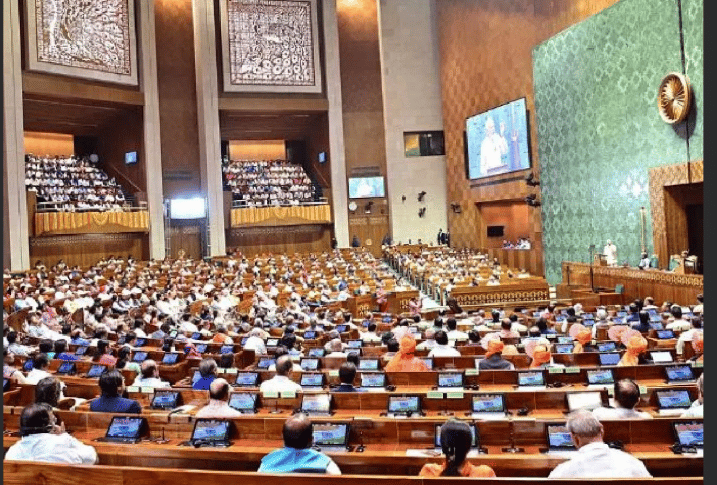Parliament Debate on Operation Sindoor: Key Issues
Parliament debates Operation Sindoor, India's strike on PoK terror camps. Key issues include ceasefire timing, foreign role, and national security strategy.
BREAKING NEWS


New Delhi | July 28, 2025 – India is bracing for a high-voltage political showdown as Parliament prepares for a 32-hour-long debate on Operation Sindoor, the Indian Armed Forces’ powerful response to the Pahalgam terror attack. The debate, expected to echo the deepest divisions in national politics, starts Monday in the Lok Sabha and continues in the Rajya Sabha on Tuesday.
While the government is poised to defend its military response as a bold and necessary counter-terror measure, the Opposition is sharpening its knives—questioning the ceasefire and alleged foreign interference in India’s decision-making.
What is Operation Sindoor?
Operation Sindoor is the codename for India's retaliatory strike following the gruesome Pahalgam terror attack, which targeted pilgrims and claimed several innocent lives earlier this month.
In a swift and high-precision military move, Indian forces targeted nine terrorist camps in Pakistan-occupied Kashmir (PoK). The operation was executed in just 25 minutes, neutralizing key terror hubs of three Pakistan-backed terror outfits:
Lashkar-e-Taiba (LeT)
Jaish-e-Mohammed (JeM)
Hizbul Mujahideen
According to a statement by the Press Information Bureau (PIB), the operation was meant to destroy terror infrastructure involved in planning and executing attacks on Indian soil. Notably, the Indian government declared a unilateral ceasefire only after Pakistan reportedly requested it—a key point likely to ignite political sparks in Parliament.
The Parliamentary Showdown: What to Expect
The debate in the Lok Sabha begins Monday at 12 PM, led by Defence Minister Rajnath Singh, who is expected to present a detailed briefing on the operation. The session is allocated 16 hours in the lower house.
On Tuesday, the Rajya Sabha will conduct a similar 16-hour session, totaling 32 hours of parliamentary time—one of the most extensive debates on a military operation in recent years.
Prime Minister Narendra Modi, External Affairs Minister S. Jaishankar, and Union Home Minister Amit Shah are all likely to intervene during the debate.
The ruling BJP will present Operation Sindoor as a decisive act of national defense, showcasing the government's commitment to eradicating terrorism at its roots. They are also expected to contrast Modi’s leadership with that of previous administrations, claiming a new standard in India's strategic doctrine.
Opposition's Sharp Criticism: Ceasefire, Trump, and National Autonomy
The Opposition, led by Congress MP Rahul Gandhi, is unlikely to let the government have it easy. Gandhi has already launched scathing attacks on Modi, calling the ceasefire a "surrender under foreign pressure."
The most controversial element of the debate revolves around former US President Donald Trump, who has publicly claimed to have brokered the ceasefire between India and Pakistan. Though India has categorically denied Trump’s assertion, the repeated claims have given ammunition to the opposition to raise questions about India’s sovereignty and autonomy in foreign policy.
Rahul Gandhi has compared Modi’s decision-making unfavorably with that of late Prime Minister Indira Gandhi, who defied the US in 1971 to liberate East Pakistan and help form Bangladesh. "Indira Gandhi didn’t need US approval to act in India’s interest. Why does Modi?" Rahul reportedly asked during a recent rally.
The Strategic Significance of Operation Sindoor
From a military standpoint, Operation Sindoor has raised several key markers:
Speed and Precision: The entire operation was concluded in under half an hour, showcasing India’s surgical strike capability.
Depth of Intelligence: Targeting nine camps simultaneously indicates accurate and actionable intelligence.
Territorial Reach: Hitting terrorist bases deep inside PoK sends a strong message to both Pakistan and the international community.
Strategic experts are already calling it one of the most well-coordinated counter-terror responses since the 2019 Balakot airstrikes.
Ceasefire Controversy: Who Blinked First?
A key aspect of the debate will be India’s decision to halt operations following a ceasefire. The government claims Pakistan reached out first for peace, and India agreed after neutralizing its immediate threats.
Critics, however, say this timing created the perception of India stepping back under international pressure, especially given Trump's claims of mediation. The Opposition wants clarity on:
Who initiated the ceasefire?
Was it diplomatically brokered by a third party?
Was India under pressure from global stakeholders, including the US?
These questions are expected to dominate the discourse in both Houses.
Public Sentiment and Political Optics
Operation Sindoor has received widespread public support, especially among national security advocates, veterans, and the youth. Social media has been flooded with hashtags like #SindoorStrike, #IndiaStrikesBack, and #TerrorFreeIndia.
For the BJP, this momentum could strengthen its narrative of being the only party capable of taking tough stands on national security. However, the Opposition hopes to puncture this by pointing to foreign influence, diplomatic overreach, and lack of transparency.
Global Reactions and Diplomatic Fallout
So far, the international community has maintained a measured response. While most Western powers have reiterated the importance of restraint, there has been no condemnation of India’s strikes, indicating tacit understanding of the threat India faces from cross-border terror.
Pakistan, however, has strongly objected and is lobbying the United Nations and OIC to condemn India. But its credibility remains weakened due to its long-standing record of harboring terror groups.
Conclusion: India at a Crossroads
As the Parliament takes up the debate on Operation Sindoor, the country finds itself at a critical juncture—balancing military assertiveness with diplomatic prudence, and national pride with global perception.
The outcome of this debate could shape the narrative for 2025 and beyond—especially with general elections on the horizon. Will the government successfully portray the operation as a bold, sovereign move against terror? Or will the Opposition's questions on the ceasefire and foreign meddling raise valid concerns about India’s strategic autonomy?
Either way, the coming 32 hours of parliamentary debate promise to be nothing short of historic.
